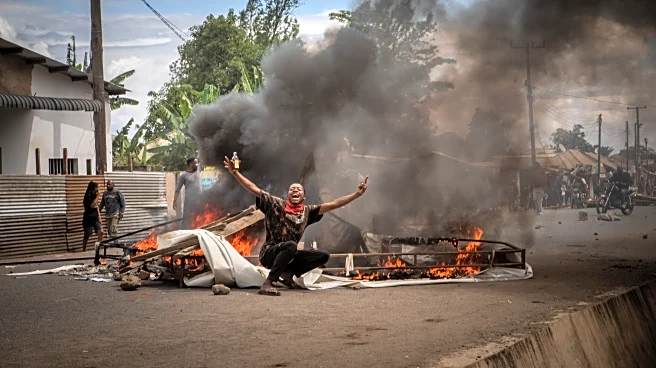ABUJA, Nigeria (AP) — The latest elections in different African countries have ended with the same outcome: sidelined opposition candidates, disputed results and protests from mostly young voters after
incumbents were reelected.
The elections featured a bureaucrat in Cameroon who has become the world’s oldest leader with half his life spent as president. An economist in Ivory Coast who is starting his fourth term at age 83. And a woman in Tanzania whose win as the country's first female president had originally created hope that change was coming — but has been denounced for an authoritarian style.
The continent of 1.4 billion people — where most countries have been independent for about 60 years — disputed election outcomes could further weaken shaky democracies and embolden soldiers increasingly taking over power, analysts says.
Africa is home to some of the world’s youngest populations and oldest leaders, a paradox that has contributed to an upsurge in coups from the Sahel region in the west to Madagascar. In many places there are deep frustrations over failed promises to provide populations with basic amenities despite rich natural resources.
The trend points to deeper structural problems with Africa's underlying political environment, said Jeffrey Smith, executive director of democracy-focused Vanguard Africa nonprofit.
He said all three countries feature incumbents leveraging state resources to stay in power, partisan security forces as well as flawed legal processes.
“This is really symptomatic of competitive authoritarianism ... where elections are fundamentally imbalanced and skewed in favor of those already in power,” said Smith. “So the real issue is a lack of genuine political competition and accountability.”
Here’s a quick look at the three elections:
At 92, Paul Biya has spent nearly half his years on Earth as President of Cameroon and is Africa’s second-longest serving leader, behind only Equatorial Guinea’s Teodoro Obiang Nguema Mbasogo.
After 43 years in power, he won his eight term in the country's election on Oct. 12, which his spokesman-turned-challenger Issa Tchiroma Bakary also claims to have won.
Biya is rarely seen in public and critics say his capacity to govern has been severely limited by his age. His reelection for an eighth seven-year term would keep him in office until he’s nearly 100.
On Monday, some Cameroonian cities were on lockdown after Tchiroma called for that as a way for citizens to protest the election results. At least four people have been killed by security forces in recent demonstrations.
Ivory Coast's President Alassane Ouattara, 83, was reelected to a fourth term in the Oct. 25 election marked by low turnout and empty streets after his main challenger was barred from running.
A court had ruled that Tidjane Thiam, Ouattara’s main challenger and a former CEO of Credit Suisse, was not eligible to run because of his dual Ivorian-French nationality, a decision that Thiam vowed to fight. Born in Ivory Coast, Thiam received French nationality in 1987 but gave it up in March.
He alleged he was excluded from the race to pave way for Ouattara’s reelection and called the election a sham. Protesters were arrested in the run-up to the election and more protests are scheduled to be held this week.
Ouattara was first elected president in 2010 but not without challenges. Then-President Laurent Gbagbo, who lost the election to Ouattara, had refused to concede defeat, resulting in an electoral crisis with thousands killed. Gbagbo had to be forced out of power with the help of international peacekeepers.
Tanzania’s President Samia Suluhu Hassan was sworn in on Monday following a disputed election that excluded her two main rivals.
The Oct. 29 election was marred by violence as protesters took to major streets to protest. The military was deployed to help police quell riots, and authorities have imposed internet outages amid the tensions.
A former vice president who rose to the presidency after the death of predecessor John Pombe Magufuli, Hassan's emergence as Tanzania’s first female president in 2021, at first brought hopes to millions after the government’s repressive tactics against opposition leaders, civic groups, journalists and others.
Critics, however, said she has failed to ease repressions and instead has shown an authoritarian streak similar to her predecessor.










